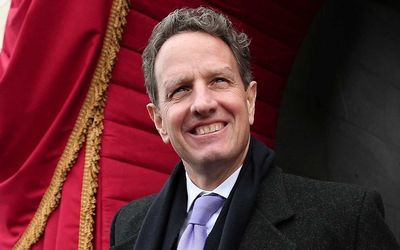POLITICAL WILL: Fiscal stability just one of many moving parts for ratings assessment
OF LATE, many of our heated national debates have been about money. The Fees Must Fall movement, Nkandla, the influence of the Guptas and many other skirmishes boil down to how government spends the country’s resources. But they are also about the kind of society we want to live in. They are battles about perceptions of equity and economic mobility, of developing human capital and confronting corruption. And in the background is the ever-present gaze of ratings agencies and foreign investors.
Much of the frenzy surrounding this year’s budget is necessitated by policy makers’ need to restore faith in the South African economy. Particular concern stems from the bogeyman of credit downgrades — to junk for foreign-currency instruments and to levels barely above junk for local currency instruments. For a small, open economy reliant on foreign capital, this is an important consideration.
Since ancient times, discussions about creditworthiness and fiscal prudence have often taken on moral tones. Those that live dangerously, overspend must be punished. Austerity must come down upon their profligate heads.
Former US Treasury Secretary Timothy Geithner wrote about calls for "Old Testament" justice in dealing with the banking sector in the aftermath of the global financial crisis. Some called for banks to be punished, broken up, not shown any mercy. And certainly no bail-outs. Geithner argued rather for "New Testament" justice — let the excesses and wrongdoing be dealt with, but do not wreck the long-term potential of the economy in the process.
Our Old Testament instincts wanted to see blood on the floor — painful tax increases, expenditure cuts across the board, a strained mea culpa for straying off the way.
Gordhan delivered some bitter medicine but found ways to keep the prevailing social compact in place. For now, poor and lower-income households have escaped an increase in value-added tax and social spending is in place. Reform is in the air, but as the minister was quick to point out, the sacred cows remain so — the private sector will play a part in state-owned enterprises, but this is not privatisation.
Everyone expects "sin taxes" to go up. Tax increases on capital gains and transfer duties for expensive properties are not about to spark a revolution. And nothing says New Testament like a tax amnesty. The voluminous recommendations of the Financial and Fiscal Commission to improve intergovernmental fiscal relations could not have found better timing than this moment. A tax on sugar-sweetened beverages in 2017 might have taken some people by surprise, but nudging people towards healthy choices while raising revenue is sensible.
In all, it looks as if the government looked under every stone to find a way to make fiscal consolidation work.
But it’s going to take more than a stable budget for SA to reach its true potential. And the most important metric will be, as always, the difference that the country’s spending and taxation decisions make to the lives of ordinary people, those struggling with unemployment and poverty.
It’s not as if ratings agencies care about debt, sustainability and growth only in a narrow sense. They have access to the same media footage as everyone else. They see the protests, the heated political debates, the fraying social fabric, and they know resources have to be spent to address the country’s socioeconomic challenges. They know, as Standard & Poor’s wrote in a 2014 note, that too many people do not have access to jobs or quality education. Extensive austerity measures that achieve short-term fiscal stability while these challenges remain, without a nod to inclusivity, were never going to be the game-changer.
Whether the budget alone, at this stage, can rescue the country’s credit ratings is an open question. Fiscal stability was always just one of many considerations. In announcing budget deficit targets that are lower than those announced in the medium-term budget policy statement, Gordhan met some of the expectations. The government’s credibility is on the line. There was no big-bang announcement. The outcome depends on so many moving parts that it demands a cautiously watchful attitude from the analyst.
• Makhaya is CEO of Makhaya Advisory

Former US Treasury Secretary Timothy Geithner. Picture: REUTERS/WIN MCNAMEE
OF LATE, many of our heated national debates have been about money. The Fees Must Fall movement, Nkandla, the influence of the Guptas and many other skirmishes boil down to how government spends the country’s resources. But they are also about the kind of society we want to live in. They are battles about perceptions of equity and economic mobility, of developing human capital and confronting corruption. And in the background is the ever-present gaze of ratings agencies and foreign investors.
Much of the frenzy surrounding this year’s budget is necessitated by policy makers’ need to restore faith in the South African economy. Particular concern stems from the bogeyman of credit downgrades — to junk for foreign-currency instruments and to levels barely above junk for local currency instruments. For a small, open economy reliant on foreign capital, this is an important consideration.
Since ancient times, discussions about creditworthiness and fiscal prudence have often taken on moral tones. Those that live dangerously, overspend must be punished. Austerity must come down upon their profligate heads.
Former US Treasury Secretary Timothy Geithner wrote about calls for "Old Testament" justice in dealing with the banking sector in the aftermath of the global financial crisis. Some called for banks to be punished, broken up, not shown any mercy. And certainly no bail-outs. Geithner argued rather for "New Testament" justice — let the excesses and wrongdoing be dealt with, but do not wreck the long-term potential of the economy in the process.
Our Old Testament instincts wanted to see blood on the floor — painful tax increases, expenditure cuts across the board, a strained mea culpa for straying off the way.
Gordhan delivered some bitter medicine but found ways to keep the prevailing social compact in place. For now, poor and lower-income households have escaped an increase in value-added tax and social spending is in place. Reform is in the air, but as the minister was quick to point out, the sacred cows remain so — the private sector will play a part in state-owned enterprises, but this is not privatisation.
Everyone expects "sin taxes" to go up. Tax increases on capital gains and transfer duties for expensive properties are not about to spark a revolution. And nothing says New Testament like a tax amnesty. The voluminous recommendations of the Financial and Fiscal Commission to improve intergovernmental fiscal relations could not have found better timing than this moment. A tax on sugar-sweetened beverages in 2017 might have taken some people by surprise, but nudging people towards healthy choices while raising revenue is sensible.
In all, it looks as if the government looked under every stone to find a way to make fiscal consolidation work.
But it’s going to take more than a stable budget for SA to reach its true potential. And the most important metric will be, as always, the difference that the country’s spending and taxation decisions make to the lives of ordinary people, those struggling with unemployment and poverty.
It’s not as if ratings agencies care about debt, sustainability and growth only in a narrow sense. They have access to the same media footage as everyone else. They see the protests, the heated political debates, the fraying social fabric, and they know resources have to be spent to address the country’s socioeconomic challenges. They know, as Standard & Poor’s wrote in a 2014 note, that too many people do not have access to jobs or quality education. Extensive austerity measures that achieve short-term fiscal stability while these challenges remain, without a nod to inclusivity, were never going to be the game-changer.
Whether the budget alone, at this stage, can rescue the country’s credit ratings is an open question. Fiscal stability was always just one of many considerations. In announcing budget deficit targets that are lower than those announced in the medium-term budget policy statement, Gordhan met some of the expectations. The government’s credibility is on the line. There was no big-bang announcement. The outcome depends on so many moving parts that it demands a cautiously watchful attitude from the analyst.
• Makhaya is CEO of Makhaya Advisory





















Change: -1.43%
Change: -1.61%
Change: -1.68%
Change: -1.58%
Change: -1.40%
Data supplied by Profile Data
Change: -0.73%
Change: 0.12%
Change: -1.43%
Change: 0.00%
Change: 0.10%
Data supplied by Profile Data
Change: 0.58%
Change: -0.23%
Change: 0.54%
Change: 0.89%
Change: 0.93%
Data supplied by Profile Data
Change: 0.90%
Change: 0.61%
Change: 0.63%
Change: 0.50%
Change: -0.41%
Data supplied by Profile Data